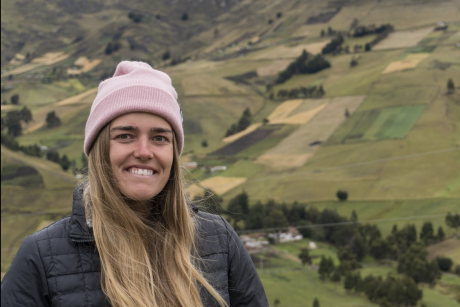
WISER students learning to construct a flashlight out of a water bottle. Photo credit: Mikayla Wickman.
Published February 24, 2015, last updated on March 26, 2015 under Education News
On February 11, Nimmi Ramanujam, professor of global health and biomedical engineering at Duke, spoke at the United Nations’ inaugural World Women’s Health and Development Forum at the UN Headquarters in New York.
Organized by the UN Department of Economic and Social Affairs and the Royal Academy of Science International Trust (RASIT), this two-day forum brought together world leaders, UN system representatives, scientists, healthcare professionals and representatives from the private sector.
The goals of the event were to (1) discuss strategies for advancing the health, wealth and empowerment of women worldwide and (2) identify the key challenges countries face in developing and enhancing women’s health.
Forum Founder Calls for Office of Women's Health
In an interview with UN Radio after she delivered her welcome message, Princess Nisreen El-Hashemite, the forum’s founder and executive director of RASIT, noted that there is currently insufficient knowledge within academia and the health care industry about women's health.
“It is important to realize that women and men have different medical needs,” she said. “As a doctor and a scientist, and as a woman, I call on ministries of health to establish an office of women's health, with a mission of protecting and advancing the health of women broadly.”
Limited Schooling for Girls Creates Barriers to Health and Prosperity
Ramanujam, also the director of the Center for Global Women’s Health Technologies (CGWHT) at Duke, began her talk by noting that in low-resource communities, particularly within sub-Saharan Africa and southern Asia, schooling for girls often ends prematurely for variety of reasons, including time-consuming household responsibilities and insufficient resources to support access to education. These challenges, she said, are often exacerbated by energy poverty—that is, a lack of access to modern energy services.
Low education levels, in turn, make girls vulnerable to early marriage, adolescent pregnancy, HIV/AIDS, cervical cancer and other health issues that significantly decrease their chances for long-term health, financial stability, and empowerment.
Ramanujam and her colleagues and students at the CGWHT have been developing strategies to combat these challenges. She remarked, “We believe that girls and young women with limited formal education need innovative, non-traditional educational models to change their lives and future trajectories.”
Technical Skills as a Path to Innovation, Entrepreneurship and Socio-Economic Development
In her talk, Ramanujam shared one project, an educational program for girls in the Women's Institute for Secondary Education and Research (WISER) in Muhuru Bay, Kenya, a school founded by Duke global health and biology professor Sherryl Broverman. The WISER secondary school for girls specifically targets the empowerment of girls through a rigorous secondary education and psychosocial support.
Last summer, Ramanujam and two Duke engineering students, Mikayla Wickman and Kendall Covington, collaborated with Broverman and Mr. Kennedy Mikula, director of studies at WISER, to form an engineering club. Through this program, they taught 52 girls—more than half of the school’s students—practical skills in renewable energy, circuit design, and the construction of manually chargeable flashlights.
Why flashlights? The students chose this project because without lighting, they were unable to study in the evening. And given that Muhuru Bay is not electrified, these skills would not only serve the students’ immediate needs, but through entrepreneurship and development, potentially serve broader community needs.
The engineering club was wildly successful and is still active almost nine months later; in fact, the students are now running the club themselves.
“Ultimately, we want to expand this program to incorporate new technology skills driven by community needs,” Ramanujam reflected, “because we want these to be income-generating activities, and we want to be able to integrate business skills and ultimately health awareness to have the greatest impact on women’s empowerment and health.”
Learn More about the WISER Engineering Club
To learn more about the engineering club, watch the video Mikayla and Kendall produced about their experience working with the WISER students:
Still want more? Read the article “Nimmi Ramanujam’s Lab of Entrepreneurial Engineers” and check out the student blogs about their experience working with the WISER students.
Listen to Ramanujam’s talk (she begins speaking at 34:10).


